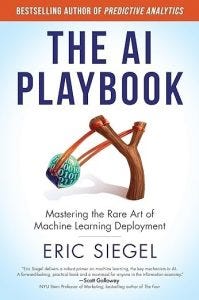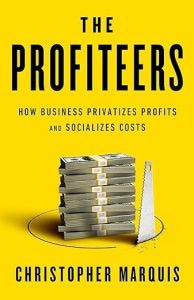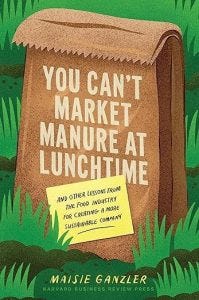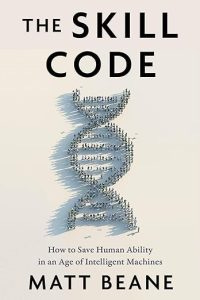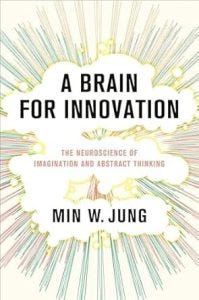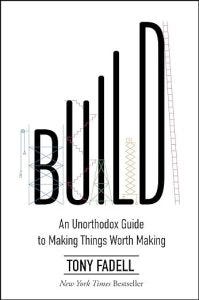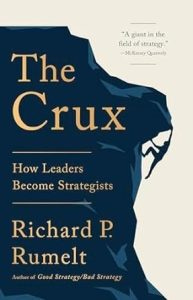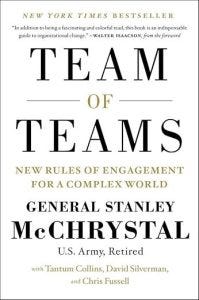Outthinker Networks’ 2024 Strategy & Innovation Summer Reading List
Click here to listen to an AI recording of this post.
For strategy and innovation leaders, staying ahead of the curve is crucial. Our annual Outthinker summer reading list aims to bring you the most impactful and thought-provoking books that are shaping our field. Throughout the year, we've curated this list from member recommendations, the latest publications, and insights from thought leaders in our community. While not exhaustive, these books represent the cutting-edge ideas in strategy, innovation, and leadership that are top of mind for our network.
Whether you're lounging by the pool or taking a break between meetings, we hope these titles will inspire fresh thinking and challenge existing paradigms.
Enjoy your 2024 summer plans (if you’re in the northern hemisphere), and while you do, consider grabbing one of the titles below.
Technology Trends
The AI Playbook, Eric Siegel
Despite machine learning (ML) being hailed as the world's most important general-purpose technology, its adoption outside of Big Tech has been notoriously difficult, with many initiatives failing to deploy or create value. Siegel offers a solution to this problem by presenting a practical, six-step approach for guiding ML projects from conception to deployment. He provides essential semi-technical knowledge for all stakeholders, outlines a gold-standard practice for leading ML projects, and shares valuable case studies of both successes and failures from companies like UPS and FICO. Readers will gain the insights needed to overcome common pitfalls, bridge the gap between business and data professionals, and ultimately capitalize on ML's potential for value creation in their organizations.
Fusion Strategy, Vijay Govindarajan and Venkat Venkatraman
Fusion Strategy offers a roadmap for navigating competitive advantage in the digital age. Govindarajan and Venkatraman introduce the concept of “Fusion Strategy,” which explores how companies can blend the physical and digital domains to create unprecedented value. They explain how industrial companies can now leverage real-time data, sensors, supercomputing, and AI – technologies previously dominated by tech giants – to transform their products, strategies, and customer relationships. By using data-driven approaches to create robust insights, companies can potentially leapfrog competitors who rely solely on traditional assets. The authors provide a first-of-its-kind playbook for industrial companies to combine their strengths in physical product creation with the power of algorithms and AI, positioning their organizations for success in an increasingly digitized future and helping them avoid falling on the wrong side of the next great digital divide.
Macroeconomics and ESG
Shocks, Crises, and False Alarms, Philipp Carlsson-Szlezak and Paul Swartz
Carlsson-Szlezak and Swartz offer a new approach to navigating today’s era of shocking headlines and increasing volatility. They challenge conventional forecasting models and doomsday narratives, instead providing a fresh, accessible framework for building sound macroeconomic judgment. Through their concept of "economic eclecticism," which combines incisive analysis, historical context, and structural narratives, the authors empower readers to realistically assess evolving risks in the economy, financial system, and geopolitical arena. This perspective-shifting guide not only helps leaders distinguish between transient disruptions and permanent structural changes but also reveals often-overlooked fundamental strengths in our current economic landscape. By reading this book, strategists can develop the skills to make better tactical and strategic decisions, avoid costly false alarms, and navigate macroeconomic challenges with rational optimism rather than unwarranted gloom.
The Profiteers, Chris Marquis
We’ve been awaiting this fresh follow-up to Marquis’ Better Business: How the B Corp Movement is Remaking Capitalism. His latest work offers an eye-opening examination of corporate practices that have far-reaching societal and environmental impacts. It challenges surface-level corporate commitments to environmental and social justice by exposing how many businesses privatize profits while socializing costs. Marquis’ investigation reveals the hidden expenses of doing business, which are ultimately borne by citizens and taxpayers. More importantly, the book doesn't just critique; it presents a new path forward for business in society, showcasing pioneers who are working to transform business practices in responsible ways. Marquis provides valuable insights into emerging trends and potential future regulations, offering a roadmap for getting ahead of the curve. By understanding and adopting these forward-thinking approaches, leaders can position their organizations for long-term sustainability and success in an increasingly socially and environmentally conscious world. For more, check out Kaihan Krippendorff's compelling conversation with Marquis on the Outthinkers Podcast.
You Can’t Market Manure at Lunchtime, Maisie Ganzler
Ganzler offers practical and realistic insights on integrating sustainability into business operations while maintaining profitability, based on her three decades of experience leading a $1.7 billion corporation. The book provides valuable lessons applicable across industries, demonstrating how to implement sustainable practices effectively and gain recognition for these efforts. No matter what industry you're in, Ganzler's stories from the front lines in the food business will inspire and educate you on what it takes to get sustainability right.
People & Workforce Trends
Generations, Jean Twenge
Unlike conventional theories that attribute generational shifts to major events, Twenge's extensive analysis of data from 39 million people reveals technology as the primary driver of generational characteristics. This insight is particularly valuable for leaders grappling with workplace dynamics, consumer trends, and market strategies. The book provides a comprehensive understanding of how different generations approach work, digital media use, mental health, and various lifestyle choices, which is essential for effective talent management, marketing, and product development. By exploring the unique attributes of Millennials, Gen Z, and Gen Alpha, Twenge's work equips leaders with the knowledge to tailor their strategies for recruiting, retaining, and engaging younger employees, as well as for developing products and marketing campaigns that resonate with evolving consumer preferences. This deep dive into generational psychology not only helps businesses stay relevant in a changing environment but also fosters better intergenerational understanding, which is important for building cohesive teams and successful organizations in the long term.
The Problem with Change, Ashley Goodall
Goodall challenges the pervasive notion that constant change and disruption are essential for business success. He draws on his extensive experience in HR leadership to argue that stability, rather than continuous upheaval, is crucial for employee motivation, productivity, and overall business performance. This book offers a fresh perspective on leadership, proposing practical strategies to create a more stable work environment that allows people and businesses to thrive.
The Skill Code, Matt Beane
At our most recent Outthinker Networks in-person roundtable in June, members were focused on the topic of training talent and developing human skills in an AI-driven world. Beane's research uncovers the essential components of how humans acquire new skills – through challenge, complexity, and connection – and highlights the role of expert-novice relationships in mastering valuable skills. This insight is particularly relevant as many organizations, in their pursuit of AI-driven productivity, inadvertently disrupt these vital learning dynamics. The book offers advice on how to integrate intelligent technologies into the workplace without compromising skill development, a concern that has significant implications for workforce planning, talent management, and long-term organizational success. For a preview, listen to our podcast interview with Beane.
Innovation & Intrapreneurship
Corporate Innovator: A Guide Through the Labyrinth, William Duggan
While innovation is frequently listed as a top priority in organizations, there's often a gap between leadership expectations and employee contributions. Duggan offers a practical guide to navigating the complex maze from idea generation to implementation, providing insights on overcoming common barriers such as bureaucracy and power dynamics. It equips readers with effective communication strategies, tactics for gaining buy-in and building alliances, and methods to overcome resistance to innovation. Drawing from psychology, historical cases, and interviews with successful corporate innovators, the book delivers actionable insights and an essential roadmap for transforming ideas into reality, making it invaluable for leaders seeking to foster a more innovative organizational culture and bridge the gap between creative potential and practical execution.
The Experimentation Field Book, Jeanne Liedtka, Elizabeth Chen, Natalie Foley, and David Kester
Many organizations say they value testing new ideas. Yet there's often a lack of actionable guidance on how to design and execute high-quality experiments in real-world settings. This book offers a comprehensive, hands-on manual for crafting and conducting useful experiments, drawing from design thinking principles and other practical business approaches. It provides a step-by-step framework, complete with user-friendly instructions, case studies, and customizable templates, guiding readers through the fundamentals of identifying testable ideas, selecting evidence bases, prototyping, and testing. By offering this invaluable toolkit, the book empowers leaders to effectively bridge the gap between idea generation and practical implementation, enhancing their ability to address pressing challenges and drive innovation within their organizations. Liedtka also joined the podcast to discuss how design thinking can unleash creativity in business.
A Brain for Innovation: The Neuroscience of Imagination and Abstract Thinking, Min W. Jung
Jung offers a unique, neuroscience-based perspective on human innovation. The book explores what sets humans apart from other animals, focusing on our exceptional abilities for imagination and high-level abstraction. By examining recent advances in neuroscience, Jung provides insights into the biological underpinnings of creativity and innovative thinking. This interdisciplinary approach, combining findings from neuroscience, psychology, anthropology, and artificial intelligence, presents a unified view of the mechanisms behind imagination, abstract thought, and creativity. The book's accessible presentation of cutting-edge research makes it an essential read for those looking to grasp the biological basis of innovation and potentially apply these insights to enhance creative problem-solving and strategic thinking in their organizations. Jung joined the Outthinkers Podcast to dive deeper into concepts from the book.
Classic Strategy and Innovation
These books did not come out in the past year, but they were recommended by members as classic strategy and innovation books they’ve enjoyed recently.
Build: An Orthodox Guide to Making Things Worth Making, Tony Fadell
This book offers a wealth of practical advice and insights from one of the most successful product designers and innovators in Silicon Valley. The book distills Fadell's 30+ years of experience leading teams that created groundbreaking products like the iPod, iPhone, and Nest Learning Thermostat, providing readers with a mentor-in-a-box experience applicable to various stages of their careers. With its unique format of quick, focused entries covering a wide range of topics from startup funding to leadership challenges, Build offers innovation leaders valuable lessons on product development, team management, and navigating tech innovation.
The Crux, Richard Rumelt
Rumelt is an academic that has written for practitioners in a very understandable way. He offers an actionable approach to strategy by focusing on identifying and addressing pivotal challenges rather than setting vague goals. Rumelt's concept, illustrated through real-world examples like SpaceX, provides a clear framework for pinpointing the most critical and surmountable aspects of a challenge that promise the greatest progress. This book equips leaders with practical tools to develop and implement effective strategies, potentially leading to significant breakthroughs and competitive advantages. Rumelt was one of our early guests on the podcast.
Team of Teams, General Stanley McChrystal, Tantum Collins, David Silverman and Chris Fussell
Team of Teams is groundbreaking approach to organizational structure and management that can dramatically improve agility and responsiveness in fast-changing environments. The book demonstrates how the principles used to transform military operations against Al Qaeda can be applied to businesses and organizations, promoting a more adaptive and flexible structure that combines the strengths of large corporations with the nimbleness of small teams. By showcasing practical strategies for empowering small groups, fostering open communication, and enabling rapid decision-making, Team of Teams provides innovation leaders with a framework for creating more resilient and innovative organizations capable of thriving in today's complex and unpredictable landscape.
Join the 4th Option Network
For coaches and other innovation practitioners, consider joining my global community of trusted strategic advisors, the 4th Option Network.






